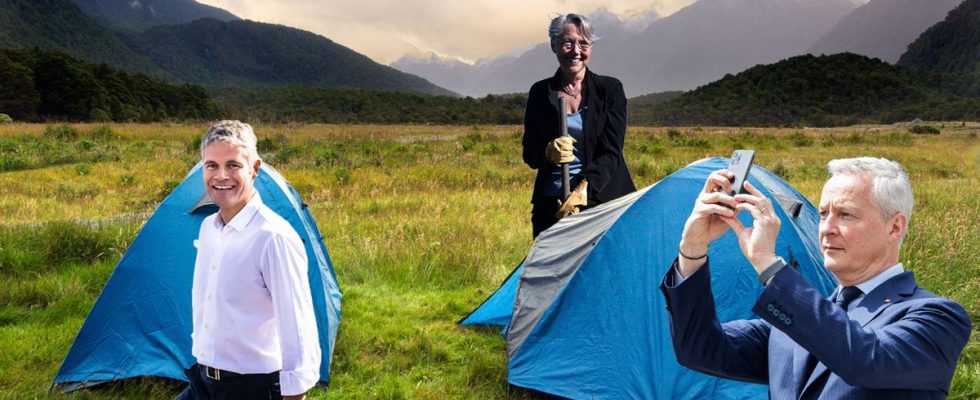“The beginning was difficult but the body gets used to the effort and a new rhythm sets in, slower, more oriented towards contemplation”. Laurent Wauquiez discovers himself poet on the route of the Pilgrims. The boss Les Républicains of the Auvergne-Rhône-Alpes region, who is walking the roads of Santiago de Compostela this summer, is not the only politician to opt for the march this summer. The Minister of the Economy Bruno Le Maire notably staged himself on the slopes of Chamonix, in the Alps, last week on instagram. Hiking has accompanied public officials for many years, from François Mitterrand to Jean-Pierre Raffarin, from François Fillon to Élisabeth Borne… But why are politicians all addicted to hiking?
Hiking, a French passion
Not wishing to disturb Laurent Wauquiez during his spiritual journey, we rather questioned deputies, followers of long walks. “It’s a simple and easy activity that anyone can do. There is the physical side, surpassing oneself, but it is also good for the mind. After 3-4 days, we enter a second state, which allows us to clear our heads. We live at the pace of walking, in a slower and more peaceful way…”, philosopher Éric Pauget, LR deputy for the Alpes-Maritimes. “We disconnect completely, it helps to come back from vacation in great shape to face the tumultuous political life that comes…”, adds this lover of the slopes of Haute-Savoie.
Aurélien Lopez-Liguori, National Rally deputy, particularly appreciates the path of Stevenson, in the Cévennes. “I like being alone with myself, for a week or two in the forest with my backpack and my hammock”, assures the elected representative of Hérault. “When we do politics, we are often in urbanized areas. Hiking is a change of scenery, we are far from the streets and the noise of everyday life”.
Disconnection, osmosis with nature, introspection… Virtues sought after for ages by climb enthusiasts. “Everyone needed to breathe, nature, to breathe… Politicians are like all French people”, laughs Séverine Ikkawi, director of external relations for the French hiking federation. Hiking has also become a real national sport, with 27 million practitioners, according to a study carried out in 2021*. The march therefore illustrates the holidays of “everyman” for elected officials in search of proximity. An inexpensive and ecological practice, in tune with the times, far from the controversies around the Jet-ski or the barbecue. “Putting one foot in front of the other also helps you think. Looking towards the horizon, it puts order in the head, our dear politicians surely need that, ”adds Séverine Ikkawi. We can remember that Aristotle, Nietzsche or Einstein liked to walk to feed their thoughts.
Pilgrimages full of implications
But in politics, the reality is often more prosaic. The walker does not hesitate to echo his wanderings on social networks or to summon the cameras. François Mitterrand, the first, builds his political narrative by establishing a kind of media pilgrimage in Saône-et-Loire. Every Pentecost Sunday, the President of the Republic climbs the Roche de Solutré, symbol of the Resistance, accompanied by his relatives… and many journalists, waiting for a good word.
Others will try to reproduce the ritual, like Arnaud Montebourg and his ascent of Mont Beuvray in the Morvan massif, or Laurent Wauquiez on the slopes of Mont Mézenc, between Haute-Loire and Ardèche. “Mountain walking is interesting for politicians. It symbolizes stepping back, reflection. It allows you to position yourself in another relationship to time, far from the immediacy of the political microcosm”, analyzes Bruno Cautrès, CNRS researcher at Cevipof. “Walking or climbing can be a real communication resource for forging one’s own mythology, cultivating one’s roots in a territory. But to work, it has to correspond to the character, ”he nuances.
In 2013, Jean Lassalle began a long walk of 6,000 km, beret on his head, to meet “French people who suffer”. A Tour de France which reinforces its atypical image of deputy-shepherd. In the summer of 2016, François Fillon tackled La Rhune in shirt sleeves, stick in hand, in the mystical fog of the Basque Country. The image is ideal for discussing “effort”, a major theme of his campaign for the right-wing primary and the future presidential election. “The top of a mountain is like happiness. We do not achieve it without effort. The candidates who say they want to straighten out France without rigor or work are wrong or lying,” he said at the arrival of the Pyrenean summit.

Ascension carries various symbolic charges: culture of effort, initiation rite, mark of rootedness, ecological homage, act of redemption… A range of possibilities that has elevated it to a classic of political communication. “The man who walks, who advances, the long time, the humility in relation to nature… He is a political chestnut tree”, mocks David Cormand, EELV MEP, ex-hike enthusiast. “Hiking is in fact a compendium of values that are precisely… in contradiction with the hypocrisy of communication”.
*Depending onn national study conducted in December 2021 by Union Sport et Cycle on behalf of the FFRandonnée, 56% of French people, i.e. 27 million people over the age of 18, declared that they had practiced hiking and leisure walking (walking) during the last 12 months.

